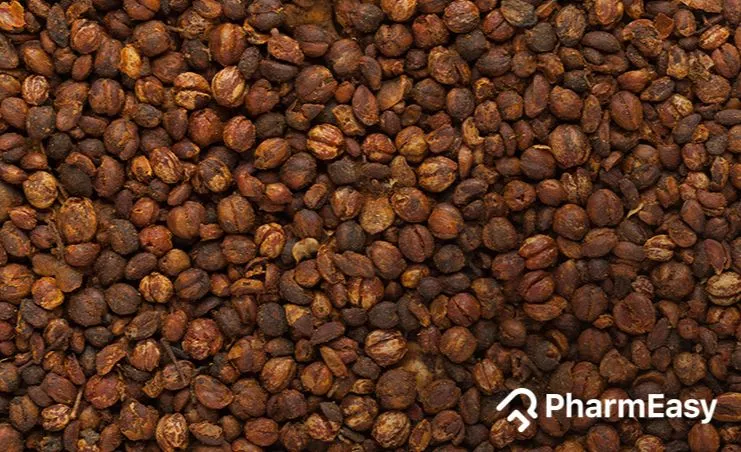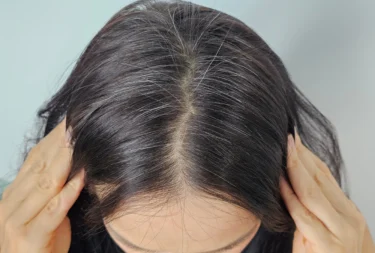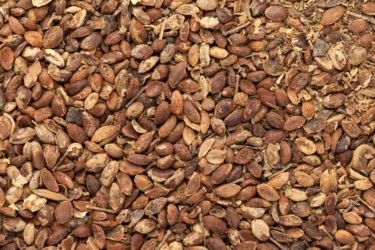Malkangani: Uses, Benefits, Side Effects & More!
By Dr Rajeev Singh +2 more

Get,

to manage your symptom
Get your,


4 Cr+ families
benefitted

OTP sent to 9988776655



You’ve successfully subscribed to receive
doctor-approved tips on
Whatsapp

Get ready to feel your best.

Hi There,
Download the PharmEasy App now!!


Register to Avail the Offer
Send OTPBy continuing, you agree with our Privacy Policy and Terms and Conditions

Hi There,
Sign up on PharmEasy now!!
Trusted by 4 crore+ families

OTP sent to 9988776655



You have unlocked 25% off on medicines




Code: NU25

Comments


Leave your comment here
By Dr Rajeev Singh +2 more
Table of Contents
Malkangani or Celastrus paniculatus Willd., belonging to the family Celastraceae, is a large, woody climber. It has a wide medicinal usage. It is also known as Jyotishmati, intellect tree, staff tree, or black oil plant. Malkangani is widely distributed across various parts of India, mainly in subtropical and tropical forests1,2.
The cold-pressed oil obtained from the seeds of Malkangani is rich in nutrients like:

Malkangani is used to treat conditions such as fistula, cold diseases (like hemiplegia, facial palsy, etc.), urine retention, lethargy, stomach problems, sexual problems, spasm, arthritis, facial paralysis, chest pain, asthma, hip pain, pneumonia, gout, amnesia (memory loss), leprosy, and eye problems1.
In Ayurveda, there are several important medicinal plants. Malkangani or Celastrus paniculatus is one of them. Several studies4 show that Malkangani may possess anti-inflammatory and antinociceptive activities and may be effective in reducing inflammation in various diseases.
Dr. Rajeev Singh, BAMS


Malkangani can be used orally to treat premature greying of hair. For this, boil milk containg Malkangani seeds and use it for preparing ghee. The ghee obtained can be used for preparing a mixture of rice and milk (kheer)1.


Local application of Malkangani oil can be beneficial in managing cold diseases like:

The oil extracted from the seed of Celastrus paniculatus which is commonly known as Malkangani might be useful for managing brain-related diseases. This is because Malkangani seed oil is believed to have anti-depressant-like effects5.
Dr. Siddharth Gupta, B.A.M.S, M.D (Ayu)
You can include Malkangani in your diet in the following ways:
Also Read: Green Peas (Matar): Uses, Benefits, Side Effects and More!
Malkangani can cause side effects such as headaches. To correct the side effects that occur due to Malkangani, cow milk or cold regimens can be used1.
Also Read: Peaches (Aadoo): Uses, Benefits, Side Effects and More!
You should keep the following points in mind:
Also Read: Multani Mitti – Uses, Benefits & Precautions
Malkangani or Celastrus paniculatus Willd. is a large, woody climber. It belongs to the family Celastraceae1,2.
The oil obtained from cold-pressing Malkangani seeds can provide you with numerous nutrients and is helpful to treat different health problems1,2.
Malkangani powder is used to improve intelligence and treat mental problems2.
Oil prepared from Malkangani seeds is highly beneficial as it:
-Boosts mental performance and increases memory.
-Treats anxiety and convulsions.
-Acts as a sleep-inducing and antioxidant agent2.
-Treats leprosy, spasm, facial palsy, and hemiplegia.
-Treats sexual problems like impotence.
-Heals fistula.
-Treats urinary retention1.
Malkangani can cause side effects like headache1.
You can use ghee prepared from milk containing Malkangani seeds to treat premature greying of hair1.
You can use cold-pressed oil obtained from Malkangani seeds or powder containing Malkangani seeds along with Malkangani fruits and flowers.
1. Malkangani (Celastrus Paniculatus Willd) | National Health Portal of India [Internet]. [cited 2022 Feb 15]. Available from: https://www.researchgate.net/publication/354427158_Pharmacological_Activities_of_Celastrus_paniculatus_Willd_A_Review
2. Mishra B, John E. A systematic review on neuro-psychopharmacological effects of celastrus paniculatus (Malkangani) oil. Research Journal of Pharmacy and Technology [Internet]. 2020 [cited 2022 Feb 15];13(5):2452–8. Available from: https://www.rjptonline.org/AbstractView.aspx?PID=2020-13-5-69
3. Arif PT. Pharmacological profile of jyotishmati (celastrus paniculatus willd): a review. International Journal of AYUSH [Internet]. 2018 Sep 30 [cited 2022 Feb 17];7(3):901–23. Available from: http://internationaljournal.org.in/journal/index.php/ijayush/article/view/137
4. Kulkarni YA, Agarwal S, Garud MS. Effect of Jyotishmati (Celastrus paniculatus) seeds in animal models of pain and inflammation. J Ayurveda Integr Med. 2015 Apr-Jun;6(2):82-8. doi: 10.4103/0975-9476.146540. PMID: 26166997; PMCID: PMC4484053. Available from: https://pmc.ncbi.nlm.nih.gov/articles/PMC4484053/
5. Valecha R, Dhingra D. Behavioral and Biochemical Evidences for Antidepressant-Like Activity of Celastrus Paniculatus Seed Oil in Mice. Basic Clin Neurosci. 2016 Jan;7(1):49-56. PMID: 27303599; PMCID: PMC4892330. Available from: https://pmc.ncbi.nlm.nih.gov/articles/PMC4892330/
Disclaimer: The information provided here is for educational/awareness purposes only and is not intended to be a substitute for medical treatment by a healthcare professional and should not be relied upon to diagnose or treat any medical condition. The reader should consult a registered medical practitioner to determine the appropriateness of the information and before consuming any medication. PharmEasy does not provide any guarantee or warranty (express or implied) regarding the accuracy, adequacy, completeness, legality, reliability or usefulness of the information; and disclaims any liability arising thereof.
Links and product recommendations in the information provided here are advertisements of third-party products available on the website. PharmEasy does not make any representation on the accuracy or suitability of such products/services. Advertisements do not influence the editorial decisions or content. The information in this blog is subject to change without notice. The authors and administrators reserve the right to modify, add, or remove content without notification. It is your responsibility to review this disclaimer regularly for any changes.
Comments

Leave your comment...

View all comments(1)
You may also like
Malkangani cold press oil.